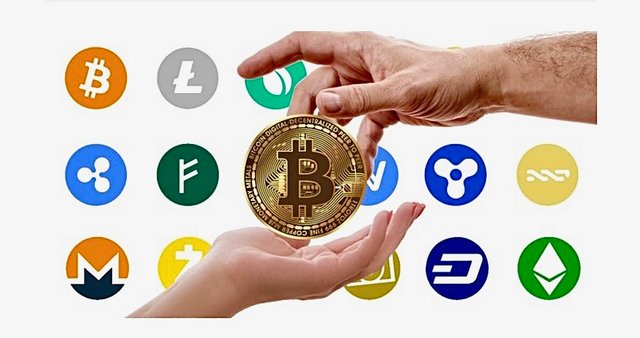
A centralized exchange
A good example of a centralized exchange would be Binance or Bittrex. Those are centralized exchanges. This means the exchange is controlled by a single individual or individuals, who take possession of all coins sent to that exchange for trading. They also control all parameters of trading, including order entry, token exchange and settlement, fee collection and the release of both deposited and traded coins.
Pros and Cons of centralized exchange
Pros
Liquidity: centralized exchanges tend to be larger than decentralized exchanges, so the large numbers of coins deposited there makes trading very easy, this is referred to as high liquidity.
Single points of contact for complaints: Centralized exchanges have a clear structure of owner, president, etc who make decisions independently and rapidly.
Ease of use: it can be very easy to send your coins to a centralized exchange, or buy uncommon coins on a centralized exchange and if you think setting up and maintaining your own desktop wallet is to complicated, using the exchange wallet is much easier.
Cons
Centralized Control: This means the exchange is controlled by a single individual or individuals, who take possession of all coins sent to that exchange for trading. They also control all parameters of trading, including order entry, token exchange and settlement, fee collection and the release of both deposited and traded coins. Sometimes traders don’t fully understand the totality of this control until they can’t withdrawal their coins because the exchange freezes their wallet, freezes withdrawals or freezes all trading. An extreme demonstration of this centralization, was an exchange where a single owner held all the private keys, and when he died unexpectantly the exchange declared they couldn’t release anyone’s cryptocurrency because all the private keys were lost.
Hot Wallets: Centralized exchanges tend to have Hot Wallets, as in wallets on their websites or connected to their websites, so they attract sophisticated thieves to hack the network security and steal the deposits. One such exchange in New Zealand witnessed a hack and the hacker withdrew tokens over several days , as the hacker had changed the private keys and locked the exchange owners out of their own wallet. Then the hacker withdrew the tokens every day for a week, as the exchange owners stood helplessly by, unable to stop the theft.
Pros and Cons of decentralized exchange
Pros
Decentralized Control: A decentralized exchange is controlled by the software and a distributed network of owners of the exchange token. Because decentralized exchanges can be truly decentralized and thus controlled by a D.A.O. or Decentralized Autonomous Organizations, which are like a large committee in control of all decisions and responses to problems. There is normally no one single person in control of all the funds. So its normally not possible for one person to run off with all the investors funds. And if a single person dies or falls ill, it is an unpleasant event, but the exchange continues functioning.
Security of funds: A truly decentralized exchange with A.M.M. or automatic market maker protocols doesn’t require you to deposit your funds in the exchange wallet, unless your participating in a Liquidity Pool. But for routine trading you just trade between your wallet and the pool wallet.
Decentralized Trading: the truly decentralized exchange doesn’t control the order book, trade settlement or prices. The software and market forces control these element control, so its hard for people who understand markets to get an unfair advantage.
Cons
Decentralized Control: Because decentralized exchanges can be truly decentralized and thus controlled by a D.A.O. or Decentralized Autonomous Organizations, which are like a large committee in control of all decisions and responses to problems. This means they can take weeks or even months to respond to problems or challenges as a large group discusses the problems and possible solutions. Unlike a centralized exchange, where the president or Vice President may make a decision swiftly and by them selves.
Liquidity: decentralized exchanges tend to have a smaller number of coins to trade, and they may have smaller volumes of those coins. So the prices may also be higher with less competition. These smaller volumes and higher prices are a characteristic of Low Liquidity environments and were common to decentralized exchanges in their beginnings. Now Uniswap, the largest decentralized exchange has grown to be the largest exchange centralized or decentralized, so it has few of those problems so common to decentralized exchanges, but the smaller ones may still be plagued by Low Liquidity .
Scams or Phony tokens:
When your performing peer to peer trades you need to make sure your trading the correct coin, not look alike names which are for projects you never heard of and projects which are short lived and later worthless. Due your own diligence, There are no trading volume or market cap requirements on decentralized exchanges and no centralized authority is vetting the coins.
Summary
As you can see there are both advantages and disadvantages of both. I should add that one of the disadvantages of decentralized exchanges Liquidity, is becoming less and less of a problem as these exchanges grow in size. Uniswap is a decentralized exchange and it possesses automatic market maker protocol. It has grown to be one of the largest exchanges in the world of exchanges, both centralized and decentralized, and while liquidity is a problem for lesser known coins, it is not a problem for popular coins and even lessor known coins can have great liquidity if their community contributes liquidity.
There are other aspects of decentralized and centralized exchanges, but I feel these comments are a good start towards better understanding of how these two types of exchanges work. What other qualities of decentralized and centralized exchanges do you feel are important?
Please list them in the comments below.

Greetings friend, good article I found very educational, is very good the comparison you made between centralized and centralized exchanges, and will be at the discretion of each user, depending on the needs that present.
See you later, have an excellent week !
Downvoting a post can decrease pending rewards and make it less visible. Common reasons:
Submit
Thank you, I am glad you found it useful.
Downvoting a post can decrease pending rewards and make it less visible. Common reasons:
Submit
Your posts are always very informative 👍😊
Downvoting a post can decrease pending rewards and make it less visible. Common reasons:
Submit
Thank you, I am glad you found it useful.
Downvoting a post can decrease pending rewards and make it less visible. Common reasons:
Submit
Personally I don't think there is so much wisdom in engaging a centralized exchange when I can get the same thing done with a decentralized exchange where I have total control over all my transactions.
I have actually heard of this Liquidity thing for a long time but I don't really know about it in details and reading through your post I have seen it a couple of times and I would like to cease this opportunity to ask please what it is.
Am still trying to get conversant with the terminologies on the blockchain so please if you don't mind I would like you to explain more please.
Downvoting a post can decrease pending rewards and make it less visible. Common reasons:
Submit
Hello @eldecor
Sure :)
Liquidity in this setting means the volume or numbers of offers to buy and offers to sell. The larger the number of buyers and sellers, the better the prices and it’s easier to either buy something or sell something, and importantly get a good price. This situation is referred to as high liquidity .
In contrast, when there are few buyers it’s hard to sell, and the price the buyers are offering my be very low or a bad price. So not only is it hard to sell something, but you may have to sell it at a loss. The similar situation applies if there are few sellers. The price tends to be high or a bad price, so you pay more then you think is reasonable. This is referred to as low liquidity.
@shortsegments
Downvoting a post can decrease pending rewards and make it less visible. Common reasons:
Submit
Wow! Quite interesting. I just learnt whales of stuffs today.
Guess I now know when to buy and when not to buy
I will sure follow you so I would be reading more of your awesome contents.
Downvoting a post can decrease pending rewards and make it less visible. Common reasons:
Submit
Thank you,
Downvoting a post can decrease pending rewards and make it less visible. Common reasons:
Submit
Both Cantralized and Decentralized Exchanges are very good. For cases of access to several altcoins, centralized exchange are doing well although they are prone to hacking compared to Decentralized exchanges whose nodes are ran by several computers in different places. Decentralized exchange gives security and keeps users identity but its liquidity and access to other exchange features is low and limited.
Downvoting a post can decrease pending rewards and make it less visible. Common reasons:
Submit
Exactly!
The challenge going forward is to fix those problems, so we can all enjoy the benefits of decentralized exchanges.
Downvoting a post can decrease pending rewards and make it less visible. Common reasons:
Submit
The pros and cons will always exist and it is up to each person to choose the best path to follow.
Downvoting a post can decrease pending rewards and make it less visible. Common reasons:
Submit
Thank you very much for the article. it's I think very good comparative analysis of both centralised and decentralised exchanges. from your discussion I have come to know a lot of new things about this two exchanges. I even didn't know that the UNISWAP is decentralized exchange. whatever. thank you very much for explaining comparatively with simple language. Hot Wallets issue is a matter of concern to me.
Downvoting a post can decrease pending rewards and make it less visible. Common reasons:
Submit